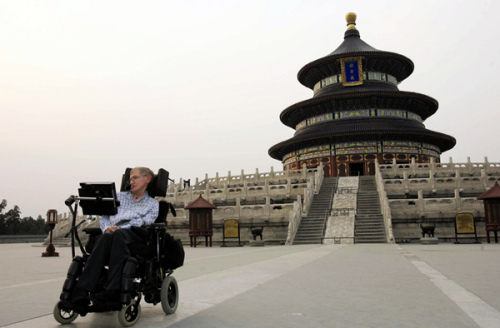
Stephen Hawking visits the Temple of Heaven in Beijing in 2006. (PROVIDED TO CHINA DAILY)
Millions of Chinese mourned the death on Wednesday of globally admired British theoretical physicist Stephen Hawking, 76, for his indomitable spirit and insightful probing of cosmic mysteries.
Netizens flooded Hawking's official Weibo account to bid farewell after the news broke in China around noon. They left more than 50,000 new comments in five hours under his last update, when he lauded young pop star Wang Junkai in November for caring about life beyond Earth.
"Cherish the memory of Mr Hawking. You forever belong to the stars and universe, and your teachings will forever be in my heart," Wang wrote, ending his sentence with a candle emoji.
News of Hawking's death quickly became the top-trending topic on Weibo and search engine Baidu. More than 380 million reads and 236,000 comments were generated on Weibo in the first five hours after the announcement.
Wang Jianyu, president of the Chinese Academy of Sciences Shanghai branch, said, "Hawking was truly an extraordinary man who gave birth to so many brilliantly innovative ideas in his so dreadful physical condition."
Hawking died of complications from amyotrophic lateral sclerosis, a degenerative disease of the nervous system that he defied for decades.
"The death of such a scientific giant is a great loss to the science community. But his thoughts and ideas will be carried on by future young scientists," Wang said. "As we mourn, science will continue to flourish."
Hawking's major scientific achievements included groundbreaking theories on the extreme conditions of black holes, super dense objects with gravity so strong that not even light can escape.
He hypothesized that black holes can emit particles and thermal radiation at an extremely slow rate near their edges, and thus can potentially evaporate. Scientists later named the theoretical emission "Hawking Radiation".
This theory thrilled scientists worldwide because it combined Einstein's General Theory of Relativity, which studies massive objects, with quantum mechanics, which deals in tiny particles, into a single, possibly observable cosmic event.
These two theoretical frameworks are the bedrocks of modern physics. So far, they have been shown to be accurate and essential in describing their own subjects, but are incompatible when used together, Hawking said.
If Hawking's theory is true, it might lead to the discovery of the "Theory of Everything" — the ultimate unifying theory to explain every physical aspects of the universe from black holes to magnetism.
"Black holes ain't as black as they are painted. They are not the eternal prisons they were once thought. Things can get out of a black hole, both to the outside, and possibly to another universe," Hawking said in a 2016 lecture. "So if you feel you are in a black hole, don't give up. There's a way out."
Hawking's humor, optimism, and uncanny ability to explain complex physics in plain words have inspired science lovers around the world.
Leonard Ng, 31 of Singapore, a doctor of engineering, said Hawking was an inspiration for many PhD students at Cambridge. "He's taught me tenacity, just to push on, mental discipline in general and to achieve the objectives I want in life especially academically," he said.
When the illustrated version of Hawking's 1988 Brief History of Time debuted in China in 2002, it sold faster than expected, said Wu Zhongchao, Hawking's former student and translator of the book. He is now a physics professor at Zhejiang University of Technology.
"Chinese media's and the public's obsession with Hawking was like nothing we had ever seen before," he said on the sidelines of the International Congress of Mathematicians in 2002, which Hawking also attended.
In August 2002, Hawking met with then Chinese president Jiang Zemin. Hawking praised China's scientific achievements and predicted China might become a global technological powerhouse by 2050, according to Xinhua News Agency.
In 2006, Hawking gave a speech on the nature of the universe to an audience of more than 6,300 people at the Great Hall of the People in Beijing, making him one of the few foreign scientists to speak there.
Hawking was an outstanding scientist who cared deeply about China's scientific development and had great interactions with Chinese scientists and science lovers, Lu Kang, Foreign Ministry spokesman, said on Wednesday.
"We mourn deeply the tragic loss of Mr Hawking. His character and his contributions shall forever be remembered," he said.


















































